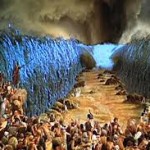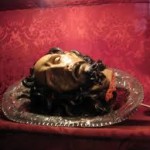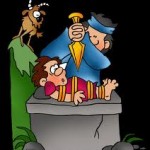The other evening Nick and I were half-watching a Stanley Cup playoff game involving the Boston Bruins. At one point the camera panned the rafters displaying the banners honoring Bobby Orr, and Nick commented, “Wow, Bobby Orr only played for 10 years.”  And then I responded with a nugget from the deep recesses of my brain, “Yes, but he finished his career playing for the Blackhawks.” Nick couldn’t believe that this was true – Bobby Orr a Blackhawk? But then he was suitably impressed when he consulted the Internet on his iPad. I was puzzled as to how I dredged up this fact – during the time that Orr played for the Blackhawks I was totally absorbed by medical school and the Blackhawks games were not televised then, so I really have no idea how I heard about it, why I chose to remember it, and how I could recall it some 35 years later.
And then I responded with a nugget from the deep recesses of my brain, “Yes, but he finished his career playing for the Blackhawks.” Nick couldn’t believe that this was true – Bobby Orr a Blackhawk? But then he was suitably impressed when he consulted the Internet on his iPad. I was puzzled as to how I dredged up this fact – during the time that Orr played for the Blackhawks I was totally absorbed by medical school and the Blackhawks games were not televised then, so I really have no idea how I heard about it, why I chose to remember it, and how I could recall it some 35 years later.
The bigger question in my mind is what my brain refuses to remember – like anything to do with the Bible. I know for a fact that I have read about or heard the explanation of  Passover, the burning bush and parting of the Red Sea multiple times – certainly more than the fact that Bobby Orr finished his career in Chicago – but I can’t give you any more details on these events other than that they were Biblical. (There is also that story about Jonah and Whale, but that might actually have something to do with Pinocchio who I think also spent time in a Great Blue. There is something biblical about Pontius Pilate, but that name only makes me think of Pierre Pilote, the sturdy defenseman, number 3 and captain of the Blackhawks in the 1960s.)
Passover, the burning bush and parting of the Red Sea multiple times – certainly more than the fact that Bobby Orr finished his career in Chicago – but I can’t give you any more details on these events other than that they were Biblical. (There is also that story about Jonah and Whale, but that might actually have something to do with Pinocchio who I think also spent time in a Great Blue. There is something biblical about Pontius Pilate, but that name only makes me think of Pierre Pilote, the sturdy defenseman, number 3 and captain of the Blackhawks in the 1960s.)
For starters I received no religious training from my parents. My mother did have a few expressions that provided some limited insight. If she was impressed by something she might say, “Jesus Murphy!” If there was something that was threatening, she might say, “Judas Priest!” and so early on I got the sense that Judas was a baddie. And then she had a favorite song called “The Very First Baseball Game,” which appealed to her love of clever  word play. I can still remember the tune and the first couple of verses – “Eve stole first, Adam second, Solomon umpired the game…” (See below for the whole song). Finally, my
word play. I can still remember the tune and the first couple of verses – “Eve stole first, Adam second, Solomon umpired the game…” (See below for the whole song). Finally, my
mother often participated in musical skits, and one involved John the Baptist. She stuck her head through a tray and surrounded it with lettuce and vegetables, closed her eyes and tilted her head to make it look she was an entrée and that’s how I know that John the Baptist was beheaded.
My grandparents faithfully attended the Presbyterian Church and my great-great grandfather was a very pious man who actually founded the church; there is even a beautiful stained-glass window in the church in his honor. But my parents never went. My best guess is that they found it too much work to get 6 children all dressed up to fidget in church. On Sunday mornings my mother was more apt to get us all bundled up and go skating at the local ice rink. Curiously, I am actually in the church regularly now since I participate in the hand bell choir. Aside from the weekly rehearsals, I theoretically should attend the church service when we perform. Our seats were right below the pulpit at one church I played in, and as soon as the very popular and articulate minister started in on the prayer of confession and the scripture lesson, my head would start bobbing and moments later I would be dead asleep. To eliminate the possibility of public snoring, I felt it was more polite to simply file out after we performed our first number and do the Sunday Times crossword puzzle until it was time to sneak back for our closing number.
best guess is that they found it too much work to get 6 children all dressed up to fidget in church. On Sunday mornings my mother was more apt to get us all bundled up and go skating at the local ice rink. Curiously, I am actually in the church regularly now since I participate in the hand bell choir. Aside from the weekly rehearsals, I theoretically should attend the church service when we perform. Our seats were right below the pulpit at one church I played in, and as soon as the very popular and articulate minister started in on the prayer of confession and the scripture lesson, my head would start bobbing and moments later I would be dead asleep. To eliminate the possibility of public snoring, I felt it was more polite to simply file out after we performed our first number and do the Sunday Times crossword puzzle until it was time to sneak back for our closing number.
Basically, I perceive the local Presbyterian Church as a very lovely event space – we got married there and it hosted memorial services for both my parents. My brothers and I met with the minister as we were planning my mother’s service. My agenda for the meeting was to let him know who was going to speak, and what songs we had selected – these were not hymns, but a rendition of “What a Wonderful World” and two nephews playing a Grateful Dead song. So I was totally surprised when the minister interrupted me, held out his hands and said, “Let us bow our heads in prayer.” Well okay, it was his house after all.
So why is it my brain is so reluctant to pluck and retain anything to do with the Bible? Why do I have such a selective lint trap? Yes, I have been lucky to live in a country and community where my cultural identity has never been challenged, so maybe that explains why religion has not played a prominent role in my life. But it must be more than that, since the Bible is the basis of so much art, literature, history, good and evil. How could I have ended up with such a gaping hole in my liberal arts education? It was time to play catch up. I knew that I could never read the Bible, and searched for an abridged “Bible for Dummies.” I found the perfect primer, “The Good Book,” by David Plotz, subtitled, “the bizarre, hilarious, disturbing, marvelous and inspiring things I learned when I read every single word of the Bible.” The blurb said “Irreverent … Plotz’s hilarious exegeses will have you laughing out loud. Who know the Bible was such a laugh riot?” Perfect, irreverence and humor just might get me through the Good Book.
It seems that Plotz and I have very similar outlooks. He is culturally Jewish, I am culturally Christian, but when he says that he goes to his place of worship as often the DMV, and with the same degree of pleasure, I am right there with him. We both know some Bible basics, such as Adam and Eve, and the Ten Commandments, but few other details. Plotz is my shepherd and he leadeth me. Off I went into a chapter by chapter recap of the Old Testament.
Oh the horror, the horror! There are gruesome tales of rape, mass murder, incest, concubines, slaves and general mayhem, more heinous than anything the Law and Order has ever come up with. The story of Dinah is one such example. The poor girl is raped by Shechem (pronounced “Shake ‘Em”), who then realizes that he loves her. (Actually there is one Law and Order plot about a woman who unwittingly marries her rapist). Dinah’s father and brothers agree to the marriage, but on the condition that all men in Shechem’s town agree to undergo circumcision. However, after the procedure, Dinah’s menfolk descend on Shechem’s village and brutally murder everyone, steal the livestock and take all the women as slaves. Plotz is aghast and so am I. Do we want our children reading this stuff? In church last week, the 4th graders were proudly given Bibles as they graduated to the next level of Sunday school. However, I don’t think that I let my daughter watch Law and Order until she was at least in 6th grade.
I went to the local library and riffled through a children’s bible and was relieved to see that poor Dinah had been edited out, but most of the rest of the Old Testament was there. And even though the stories are sugarcoated and come with gentle illustrations, the horror cannot be totally eliminated. There is Abraham who is given a test of faith and ordered to sacrifice his son Isaac. The children’s Bible dutifully shows father and son climbing the mountain gathering wood to make a fire. Isaac innocently asks his father the whereabouts of the sacrificial goat, never dreaming that his beloved father is about to kill him. The  children’s Bible then shows a picture of panicked Isaac tied to the funeral pyre, with his father holding a knife a millimeter from his neck. Only then does God relent. Are you kidding me? This is the warm and fuzzy God that we want our children to love and respect?
children’s Bible then shows a picture of panicked Isaac tied to the funeral pyre, with his father holding a knife a millimeter from his neck. Only then does God relent. Are you kidding me? This is the warm and fuzzy God that we want our children to love and respect?
And then there is the story of David who lusts after the lovely Bathsheba, the wife of his brave and loyal general Uriah. David seduces her and gets her pregnant, and then recalls Uriah from the front in the hopes that he will bed his wife and think that the impending child is his. When that plan backfires, David connives to send Uriah off to certain death in a battle in order to marry Bathseba. David has now violated at least three commandments (coveting a neighbor’s wife, lying and killing). God is displeased, but only punishes David indirectly through the death of his innocent newborn son. Come to think of it, there is another Law and Order episode about a woman who inadvertently marries her husband’s killer, but this man is more appropriately punished – life without parole. I am beginning to think that the Old Testament was good source material for the most lurid episodes of Law and Order.
I do thank Plotz for introducing me to Leviticus 19, which lists a charming set of laws that address basic human behavior, such as stealing, lying or killing, or degrading your daughter by making her a prostitute. Then there are laws that address issues of everyday life, including business ethics. My favorite is “Do not use dishonest standards when measuring length, weight or quantity.” This is an enduring business ethic, whether it is the humble shopkeeper with his finger on the scale or the dissembling Wall Street banker. Here is the oddest law of all, “Do not wear clothing of two different kinds of material.” This law has not stood the test of time.
As I plowed through the Plotz’s version of the Old Testament, I suddenly realized why my brain is so resistant to the Bible. I envision a swing where the perfect time to give it a push is in the instant of stillness at the height of the arc. A push at any other time results in chaos. I have recognized that my brain has that moment of stillness for a limited number of things – pattern recognition is one general theme that manifests itself in birdwatching, crossword puzzles, looking at pathology slides under the microscope, knitting patterns, etc. I have also recognized that my brain is very literal. There is simply no moment of stillness for fantasy. I’m sorry, but that is how I would categorize much of the Old Testament. The Bible might say that burning bushes, parting of the Red Sea and Jonah and the Whale are miracles, implying that there is an explanation, but it’s just beyond or earthly understanding. I categorize these events as fantasy, implying that there is no way, no how, that they could ever be true. My innate aversion to fantasy is consistent. I have a similar lack of interest in Greek mythology (when did the Greeks recognize that their Gods were myths?) and have never seen any episode of Star Trek, Star Wars or Harry Potter.
And so I come to the end of “The Good Book,” and here is what one Bible illiterate thinks. I should preface this by saying that Nick and I miscommunicated on our Costco runs and we now have 10 pounds of limes in the fridge. I’m diligently trying to work my way through  this green mountain and am now on my fourth lime-laden margarita. But here is it. I certainly recognize that the Bible and the church are a source of community and strength to millions, but organized religion just don’t resonate with me. I don’t have a beef with the Bible, there are many good stories, and the book of Proverbs seems particularly peppy and offers some good advice. But I already know that there are endless opportunities for self improvement and the prayer of confession at the beginning of the Presbyterian service is a definite downer. But the main issue is that I can find spirituality without a guide book; if I keep my eyes open and take a walk in the park my brain will find a still moment and let random wonder and awe pour in.
this green mountain and am now on my fourth lime-laden margarita. But here is it. I certainly recognize that the Bible and the church are a source of community and strength to millions, but organized religion just don’t resonate with me. I don’t have a beef with the Bible, there are many good stories, and the book of Proverbs seems particularly peppy and offers some good advice. But I already know that there are endless opportunities for self improvement and the prayer of confession at the beginning of the Presbyterian service is a definite downer. But the main issue is that I can find spirituality without a guide book; if I keep my eyes open and take a walk in the park my brain will find a still moment and let random wonder and awe pour in.
The missing words in the following poem are anagrams (i.e. share the same letters like spot, post, stop) and the number of asterisks indicates the number of letters. Your job is to solve the missing words based on the above rules and the context of the poem. Scroll down for answers.
Let’s review God’s cruelty through the misfortunes that are Job’s
God lets Satan kill his family and in despair Job tears off his —–.
Then Satan tests him with skin lesions and a maggot that —– into his skin
Three friends arrive and are appalled at the bad shape Job is in.
Despite their —– words of advice Job asks the eternal question Why?
Why would a kind and loving God permit such suffering and not let me die?
*
*
*
*
*
*
Answers: robes, bores, sober
Complete Lyrics to “The Very First Baseball Game”
By Arthur Longbrake, 1906
Eve stole first, Adam second;
Solomon umpired the game.
Rebecca went to the well with a pitcher,
And Ruth in the field made a name.
Goliath was struck out by David —
A base hit was made on Abel by Cain,
And the Prodigal Son made a great home-run.
Brother Noah gave checks out for rain.
Jonah wailed — went down swinging.
Later he popped up again.
A lion-drive by ole Nebuchadnezzar
Made Daniel warm-up in the pen.
Delilah was pitching to Samson,
When he brought down the house with a clout,
And the Angels that day made a double-play
That’s when Adam and Eve were thrown out.
Ole St. Pete was checking errors,
Also had charge of the gate.
Salome sacrificed Big John the Baptist
Who wound up ahead on the plate.
Satan was pitching that apple
And looked as though he might fan ’em all,
But then Joshua let go a mighty blow
And blasted one right at the wall.
And then the Lord wound up and took good aim,
And started the very First Baseball Game.
And, now we all know the way that the game was begun,
And to this very day — It’s still Number One!
Share:
